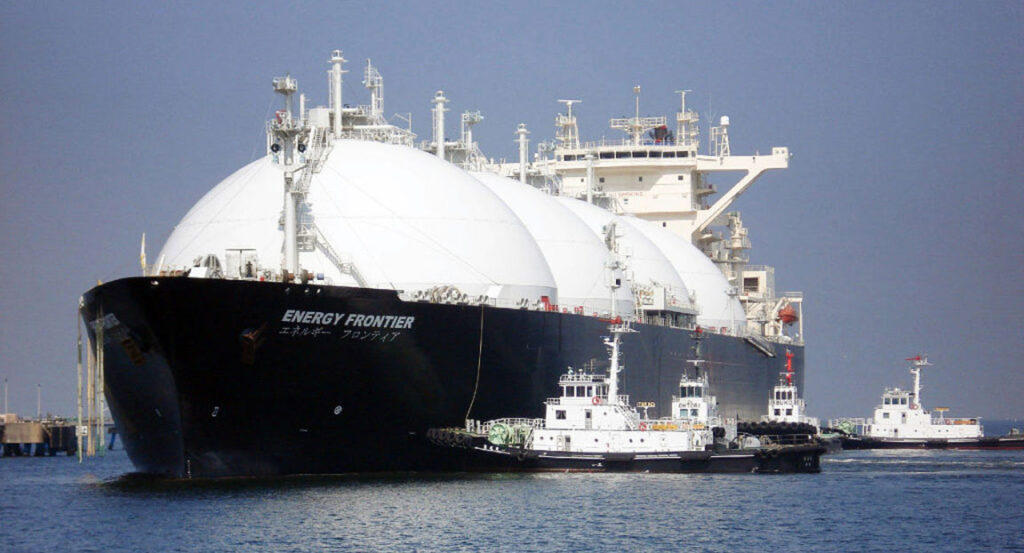Five Russian LNG tankers, similar to the one pictured, have been deregistered and now operate as a shadow fleet trying to evade sanctions levied after Russia’s 2022 unprovoked invasion of Ukraine. AFP/GETTY IMAGES
THE WATCH STAFF
A Russian “shadow fleet” of unlicensed tankers trying to circumvent international sanctions traveled near Norway’s territorial waters in September 2024. The Russian fleet is operating outside of the international rules-based order and poses environmental and security risks for NATO members on the alliance’s northern flank as the tankers travel from the Russian Arctic loaded with compressed natural gas to seek illicit sales, which aids Russia’s illegal invasion of Ukraine.
The Russian ship, New Energy, is the latest example. The tanker brought on its liquefied natural gas (LNG) cargo from another ship off the coast of Egypt after sailing from the Russian Arctic through the North Atlantic, past Gibraltar and into the Mediterranean Sea, reports the High North News, a Norwegian newspaper. The New Energy’s voyage was halted at the Suez Canal, however, after the Pacific Island nation of Palau pulled its flag from the ship. The regulated sea-lanes in the Suez Canal forced the ship to turn back to its Arctic port, again passing close to Norwegian waters before rejoining a half-dozen other aging Russian tankers gathered in the sea near Murmansk. This shadow fleet is being used to transport oil and gas to buyers willing to violate the international sanctions placed on products after Russia’s 2022 invasion of Ukraine.
“The suspension or revocation of a vessel’s flag has serious implications: indeed, being flagless impacts a vessel’s navigation and insurance cover,” Enrico Vergani, a logistics, transport and shipping expert at the European law firm BonelliErede, told High North News.
Palau suspended the registration of five Russian ships in August 2024. Since then, the ships have remained in an Arctic limbo with at least three passing by Norwegian waters trying to evade sanctions, the newspaper reported. “Growing concern has emerged amongst open registries about the risk of being subject to sanctions, leading them to suspend or revoke their flag from several vessels associated with sanction evasion,” Vergani said.
Norway is not the only Nordic country and NATO member alarmed by Russia’s shadow fleet. Denmark has mulled options to stop uninsured or underinsured tankers transporting unlicensed and sanctioned oil or gas through the Danish straits. Russia sends about one-third of its oil production from ports in the Baltic Sea to the global market via the Danish waterway connecting it to the North Sea, the newspaper reports. Aside from the attempt to flout international rules, the Russian actions pose environmental and maritime risks as the country’s aging tanker fleet sails without regulation or supervision. “Flagless vessels and vessels that use open registries because of sanctions and flag revocations pose challenges for maritime operations. International bodies must address these issues to ensure safety and sustainability, Vergani told the newspaper.
The Russian tanker Pioneer turned off its tracking signals and sent out “spoofing” information that concealed its cargo of LNG in August 2024. The High North News reports that at least three Russian vessels have turned off their transponders to evade sanctions and disguise their movements. The disabling or spoofing of such signals represents a violation of International Maritime Organization’s International Convention for the Safety of Life at Sea conventions.

